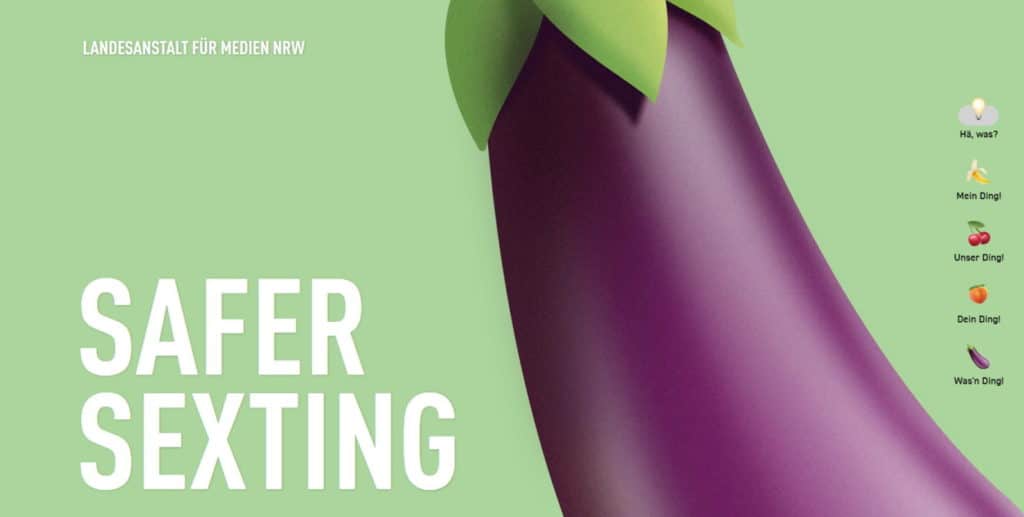Sexting is a term that has been heard more and more frequently, especially in recent years. The term is a combination of “sex” and “texting” and refers to the exchange of erotic messages, photos and videos .
sexy content popular among young people However, there are some risks and dangers that should definitely be taken into account. This is especially true if you are not yet of legal age.
Would you like to get involved in sexting? Or, as a legal guardian or educator, would you like to strengthen your competence in this area in order to convey a safe approach to erotic exchange?
Then this guide to safer sexting help. The risks and dangers should be highlighted in order to develop awareness and understanding of them. You should also learn how to avoid them or at least reduce them.
Short foreword
To be clear upfront: sexting will never be 100 percent safe. When exchanging content via digital media, despite all caution, there is always a residual risk that shared content will find its way to third parties or to the public. So before you start your first sexting adventure , you should be aware of this.
You always take a certain risk when sending or receiving erotic messages, photos or videos. If you don't want to take any risks, you shouldn't sext.
For everyone else, below we present tips and advice provided by experts to make your sexting experiences safer.
What is sexting and why do so many people do it?
While some people define sexting as the digital sharing of nude or explicit photos and videos, we also define sexting as sending messages of a sexual nature. Even if you don't share media like photos or videos, a steamy text exchange is still sexting and still carries some risk of embarrassment.
The answer to the question of why people practice sexting is pretty simple: sexting is fun and exciting. At the same time, sexting with a smartphone is very easy and has great appeal.
For couples in long-distance relationships, sexting keep passionate communication and sexual desire blazing and fuel anticipation. For others, it's just another route to intimacy. After all, most of us text and chat all the time, and it's natural to extend that into our love lives too.
A pleasant side effect is that sexting cannot spread any (venereal) diseases or lead (at least not directly) to an unwanted pregnancy. Even in times of lockdowns and Corona restrictions, sexting has helped many sexually active people get through the difficult times.
There are times when the benefits of sexting outweigh the risks. In principle, however, it is always up to you to decide how you evaluate it and which decision to make.
Important information for young people / minors
At this point we would like to emphasize that this guide is aimed exclusively at adults. As a minor, for safety reasons you should either refrain from doing so for now and wait until you are 18 years old. Or you can exercise particular caution.
For many young people who are just discovering their sexuality, sexting an important role. However, if at least one minor is involved, some rules of the game must be adhered to in order to protect yourself and others from sometimes dramatic consequences.
Many young people are not aware that creating, possessing and sending pornographic material can be a criminal offense. This is also reflected in the crime statistics from the North Rhine-Westphalia State Criminal Police Office , which show that young people are increasingly becoming criminals when it comes to the distribution of child and youth pornography. This enormous problem makes it clear that clarification is urgently needed.
The NRW State Media Authority has now launched a broad campaign to raise awareness about the topic of safe sexting .

The aim of the measure is to provide young people with legal certainty, to educate them and to offer direct help. On the campaign website www.safer-sexting.de you can find out extensive information about what is allowed when sexting, what you should pay attention to and what you should definitely avoid. also find materials there that can be used to address the topic of sexting in youth work in an age-appropriate manner.

You can also find further information about sexting and how to deal with it safely at klicksafe :
Consent is mandatory
Sexting should be about: “It involves two adults consensually engaging in sexually arousing behavior.”

Respect personal boundaries! Photo by Philipp Wüthrich @phiwut, via Unsplash
The important part of this sentence is “consensual” . Sexting should be fun and wanted by both people. If it is just one person sending unsolicited sexual messages or images to another person without their consent, then it is simply sexual harassment. Just like in real life, you need to make sure the other person is willing before you start sexting like crazy.
So before you rip off your clothes and pull out your selfie stick, have a serious conversation with the person you want to have digital sex with. Make sure she's as enthusiastic as you are. It's definitely more fun when everyone feels safe.
Trust and secure communication: setting ground rules
Even if you're sending sexy messages to your spouse of decades, we recommend having a conversation beforehand about expectations and safety around sexting
Just as you can discuss other health and safety issues with your sexual partners, you should also talk openly about sexting before you do it.
Do you only like flirty or dirty text messages or are pictures and videos also on the table? Want to make sure your sexting partner only sends messages when you're at home? What lengths will you both go to to protect the other person's privacy?
Set some ground rules and don't be afraid to decline options that make you feel uncomfortable or vulnerable. It is much better to raise these concerns now rather than after the fact. If your potential sexting partner expresses concerns, please make sure you adhere to the boundaries he/she suggests.
Some people engage in sexting as part of their online dating life. This means they may be sexting with semi-strangers or even complete strangers. Of course, we don't condemn it in any way, but we would like to point out that there is a higher risk.
If you want to send sexy messages to someone you don't know very well, please take a few extra precautions . Be sure to consider using a messaging service that is not tied to your real name or phone number. And especially stay away from any images or messages that could be used to identify you or where you live - such as: E.g. face, address information in the background, etc.
What could go wrong with sexting? And how you can deal with it.
Unfortunately, a lot can go wrong when sexting. Photos or messages could be intercepted by people you know. This can even be accidental, such as a friend glancing at a notification when a raunchy message arrives on your smartphone. For many people, this is much worse than publicly leaking sexts, depending on whether you can be identified as one of the participants.
Also remember that content from both your site and your sexting partner's site can be intercepted.
There is an unavoidable risk that your sexts will be seen by someone other than the intended recipient. Whether someone has intentionally betrayed your trust or the accounts have been hacked, the end result is still the same: you could be exposed, and in the worst case scenario, even exposed.
If the consequences could even be traumatic (such as losing the ability to support yourself financially, losing custody of children, feeling suicidal, etc.), then you should probably stop sexting. These worst case consequences are harsh and no one deserves them for consensual sexual activity. However, they exist and one must be aware of them.
So what are the risks? Here are some of the most common dangers
Digital media is inherently reproducible. Anyone can take a screenshot from their phone or computer, or even use another device to take a picture of a screen. Once the original is copied, each copy can be copied and transmitted an infinite number of times. It is also said: “The internet never forgets”.
When you engage in sexting, you also run the risk of someone copying your texts, images, and videos. It is an unavoidable risk.
Have you become a target?
If you are a high-profile person, such as a celebrity or politician (a prominent case in the media: Jeff Bezos ), or if you have another sensitive facet in your life (e.g. you are an elementary school principal or a member of a political or nonprofit organization), you may have more to lose if your sexts were leaked to the public, a board of trustees, your boss, and so on.
People can be idiots. Just because you're not famous doesn't mean you can't become a target for blackmail or harassment. Revenge porn , where private messages are posted online as an act of revenge, is a very real and widespread problem. Some laws are beginning to address this practice, but it is still a major danger. Cyberbullying also a big problem, especially among young people.
It gets even worse: some hackers practice so-called “sextortion” . Here, an attacker blackmails victims with embarrassing information - sometimes photos or videos taken via their webcam without the victim's knowledge. In the most twisted examples, attackers demanded more explicit material from victims.
If you receive a consensual sext, it is your responsibility to be a decent human being by never sharing it with anyone else. Even if that person later hurts you, even if you think that person deserves to be punished for wrongdoing, using their own body or sexual desires to publicly humiliate them is never justified. Never. You are a good person, so act like it.
People lie. Just because you're honest doesn't mean the other person is too. Maybe it doesn't protect your photos as well as you'd like, or maybe it betrays your trust and shows your photos to other people. Or maybe the person isn't who they say they are. Maybe she is a criminal, an extortionist, or a minor.
The most important measures for your safety when sexting
1. Save nude photos safely
Sure, the risks can be scary, but knowing the specific risks helps find good solutions.
First of all : How will you store and send your sexts? Here are a few things you should consider before you go:
First, pay attention to where the photos you took are stored on your smartphone. Are they backed up online? Are there other apps on your phone, like Google Photos, that also copy your photos?
We recommend reviewing your photo capture and storage practices so you know exactly where everything is. Also make sure to clean up your devices often. Delete your unwanted nude photos or move them to secure storage (ideally encrypted and password protected). There's nothing worse than trying to show a friend your vacation photos and accidentally revealing something too private.
2. Less details, less risk
If you show less of yourself, you put yourself in less danger. Even pictures that don't show all body parts can be erotic, and those that don't show everything remain more interesting.

Photo by Dainis Graveris @dainisgraveris, via Unsplash
Consider hiding identifying features such as your face, tattoos, birthmarks, or revealing objects in the background . Take photos of yourself or edit your pictures so that your face cannot be seen. If the image is distributed without your consent, it's still not nice, but you won't be able to be identified.
After all, sexting is best done in private. Even if you flirt with someone you trust, don't do it in public. An eye over your shoulder could turn into a smartphone camera over your shoulder. Keep your private information under wraps.
3. Secure sending
How you send your sexts is almost as important as the content of your sexts. Depending on which messaging service you use, you may be unknowingly putting yourself at risk.
Signal is a messaging service that values privacy and security . All your messages are end-to-end encrypted , so they cannot be read even if they are intercepted. Signal is tied to your phone number, but also has an account feature that lets you hide personal information.
You can set a time limit for deleting messages and attachments , and the app stores images you send and receive with Signal separately on your device. We generally recommend Signal as a secure messaging service that's easy to use.
SMS and text messaging are the old mainstay for messaging, sexy or not. They are tied to your phone number, which in turn can be traced back to you with some effort. They can easily be deleted but not recalled, and there is no way to have messages deleted automatically.
Additionally, some devices automatically save all attachments and, in some cases, back up messages and attachments to the cloud. Remember those Celebrity News iCloud hacks from a few years ago? Hackers tricked victims into entering their credentials using fake phishing pages and were able to access the online backups.
That's why we recommend two-factor authentication (2FA) wherever possible. With 2FA, an attacker can't access your account with just your password.

Photo by Christian Wiediger @christianw, via Unsplash
Similarly, WhatsApp tied to your phone number and is owned by Facebook. While its messages are encrypted, it has the ability to create backups and store images you send and receive. If you use this service, you should be aware that hackers are targeting WhatsApp's local backup feature to access your messages.
However, there are some advantages to using Apple's Messages app . While the information is stored online, it is encrypted so that even Apple cannot access it. If you go this route, you should be aware that online backups are a potential source of errors. Inform your sexting partner and be careful of phishing sites .
With Google Voice you can send and receive calls and text messages to another number. You can also create a new Google account to further separate your voice number from the rest. But make sure you know how and where the app stores photos and messages on your device.
Facebook Messenger is a very convenient messaging service that is widely used and includes a secret messaging mode where your messages are end-to-end encrypted. This means (at least in theory) that Facebook can't see these messages and they should only appear on the device you sent them from and the device that receives them. You can also set a time limit for messages sent in Secret Mode, which automatically deletes messages after a set amount of time.
However, this messenger is always tied to either your phone number or your Facebook account or both and therefore does not allow for much anonymity. Plus, most people don't know how to use secret message mode, increasing the chances of a slip-up, and Facebook's privacy record is spotty at best.
sext with someone this way and be aware of the (residual) risk. We believe secret message mode is the best way to use this app. Additionally, its future is unclear given Facebook's stated desire to merge it with Facebook's Instagram and WhatsApp .
Alternatively, you can use the messaging functions integrated into social networks or dating sites . OkCupid , Twitter , and Snapchat all have messaging integrated. If you go this route, we recommend using a different account than the one you use every day.
This makes it less likely that you'll accidentally post something you didn't mean to share and allows you to protect your identity. Please note, however, that data protection is not necessarily the top priority for these services. If you go this route, you should take steps to hide who you are in the sign-up process by using disposable email address or a secondary phone number
There are many other options for sending secure messages , like Wickr and Briar , and semi-anonymous messages like Kik . Each has its own pros and cons, and we recommend doing a little research before making a choice. Make sure you know how messages are stored, whether they are encrypted or not, and whether they can be accessed by anyone other than the recipient.
Whatever you do, don't reuse passwords (keyword: password recycling). If you use the same passwords for multiple accounts and one account is hacked, the hackers will try your password on other accounts. It will happen! It is perhaps one of the most common ways people get “hacked.” Do not do it! Use a password manager and increase your password security.
Be particularly careful with Snapchat
SaferInternet.at urges you to be particularly careful when using the photo app Snapchat. Snapchat is known for sending friends and acquaintances photos or videos that are only visible for a short period of time (1-10 seconds). Young people in particular like to send revealing photos via Snapchat. The photos are not really gone, but can be made visible again in various ways, e.g. For example, the recipient can screenshots of images or save them using special apps .
Therefore: It's best to only send photos via Snapchat that you would also post elsewhere!
4. A responsible regulation
While most people are concerned about the risks of sending sexts, there are also risks and responsibilities of receiving them.
Think about your backups. Contrary to most advice you hear about photos on your smartphone, you shouldn't automatically back up photos if they are private in nature. Make sure you turn off automatic upload features in apps like Dropbox and Box, as well as Google Photos and the Apple Photos app .
Agrees on rules for deleting content and follows them. Stay safe, be smart and delete your dirty talks and pictures regularly. Agree with your sexting partner how often you will delete pictures and check in from time to time to make sure they are doing the same.
Again, there is no way to stop a determined person from taking a screenshot or somehow copying a file. But you can make your opinion known and clearly state whether you want your partner to keep copies of your sexy exchanges or not.
Be smart about how to delete content correctly, completely and effectively . For example, if you mark iPhone photos for deletion, they won't be permanently deleted for 30 days. She simply moves her phone to an album called “Recently Deleted.” You need to go to this folder for permanent deletion and force delete to get rid of them immediately. The same applies to other photo services.
Note that some services like those from Google and Apple sync your images between devices. Simply deleting the image from a device does not mean that the images are permanently removed. It's best to check how your settings are configured.
Even if you delete files completely, there is still a chance that someone can forensically recover the data. It is very difficult, but you should be aware that it is technically possible.
Hide texts on the lock screen . Although we recommend that you avoid using the default texting app for your sexting, there is no guarantee that your sexting partner won't make a mistake and text you a tantalizing description of themselves. So be extra careful and disable the setting that allows messages to appear on your phone's lock screen. (Even if you're not sexting, hiding messages on your lock screen is a very good safety tip.)
5. Be sure to consider age
Attention: Pornographic images of children under 14 are considered child pornography and may not be produced, possessed or forwarded (see Section 207a StGB - Pornographic representations of minors ). Pornographic images of young people aged 14 and over are referred to as youth pornography. Here too, the production, possession and distribution can be punishable.
Exceptions only exist for recordings of young people over the age of 14 if they are of oneself and the consensual exchange takes place between two responsible young people for personal use. However, it is still forbidden to show this photo to others or forward it to third parties !

6. Dickpics and Co – What to do with naked pictures? + Safe sexting tips
How do you react if you suddenly receive a naked picture of someone? How can you safely send sexy photos of yourself? You'll find out in the video.
Happy Safe(r) Sexting!
What did we learn? When we open ourselves up to any kind of intimacy, we always put ourselves at some risk. This applies online as well as in person. So be smart, take the precautions described in our safer sexting guide and above all: be kind, fair and responsible with private content. Respect the boundaries of those around you and be a good steward of sensitive information.
When sex – or sexting – is safe, it’s a lot more fun 🙂

